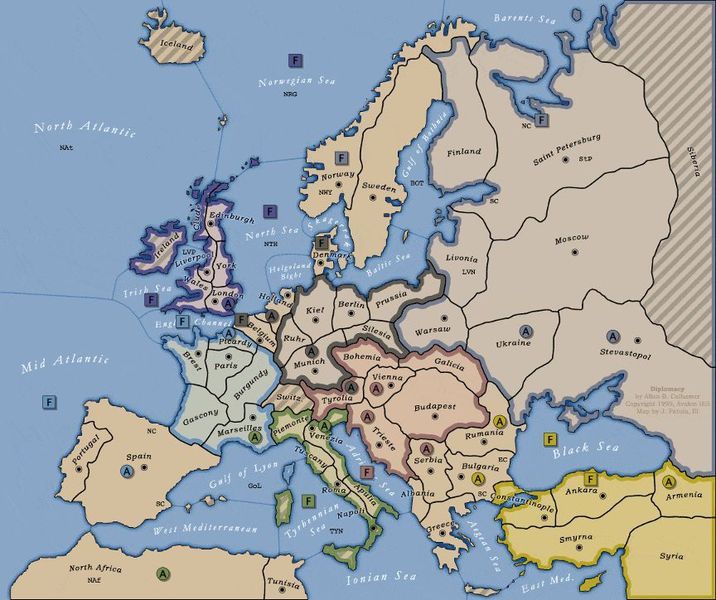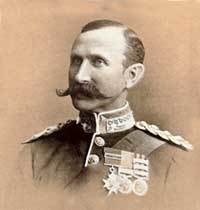This edition of the Daily Dissembler is dedicated to the memory of Robert Audin, who passed away recently at too young an age. Robert was an avid war gamer, painter, and blogger. He played Russia in the Diplomacy game I ran here in 2014, and I like to think he would have enjoyed the Dissembler's gentle silliness. He was creative and clever, with many ideas and projects that sadly died with him. Rest in peace, friend. MP+
The Daily Dissembler, Special European Gazette Issue, June 15, 1902
We make sense of a complicated world so you, dear reader, can enjoy the Gilded Age.

“A Turn-up for the Books!” Our Expert Offers His Analysis

General Erasmus Blatt.
The editors are delighted that General Blatt, hero of the Empire’s campaign to subjugate the striking coal miners of Tiddleypool, has agreed to provide commentary on the unfolding events in Europe. General Blatt’s column is syndicated by the Rioters News Agency.
A few surprising revelations have discovered themselves in the spring campaign season for 1902. Though your correspondent was correct about some matters, he admits to have been somewhat mistaken about others. Then there are one or two of my forecasts that have been proved right, but in unexpected ways.
There is no four-way alliance against the Austria-Hungary Empire. Not that this was really expected, but it seemed possible that the Asiatic Powers at least might be in cahoots, despite events around the Black Sea coasts. That there could be a military alliance between Addul Hamid II and Franz Josef did cross my mind, but events gave no real indication that any such arrangement existed. As it transpires, in the Great Game, a Statesman does well to play his cards close to his chest.
It is now clear that Turkey and Austria-Hungary are acting in concert. Their combined forces have destroyed for good the Russian Black Sea Fleet – gone forever the Romanov dream of an untrammeled sea-going passage to the Mediterranean. Further, the purpose of Turkey’s raising the army in Smyrna has been revealed. Pursuing the Russian Army counterattacking from Armenia and recapturing Sevastopol, it is now on the borders of that Tsarist province. The three-pronged attack in the fall season cannot fail to ensure that Sevastopol changes hands a third time.
It is now clear that Turkey and Austria-Hungary are acting in concert. Their combined forces have destroyed for good the Russian Black Sea Fleet – gone forever the Romanov dream of an untrammeled sea-going passage to the Mediterranean. Further, the purpose of Turkey’s raising the army in Smyrna has been revealed. Pursuing the Russian Army counterattacking from Armenia and recapturing Sevastopol, it is now on the borders of that Tsarist province. The three-pronged attack in the fall season cannot fail to ensure that Sevastopol changes hands a third time.
I can perhaps excuse my assessment of a Hapsburg- Ottoman rapprochement as unlikely by the observation that Turkey seems so far to be garnering all the fruits. Master of the entire Black Sea littoral by the end of 1902, the Ottoman Empire will have doubled its military resources (6 supply centres from 3), the Hapsburg having expanded by a third as much (4 from 3).
The attentive reader will understand by now why your columnist expected an army to be raised in Moscow in 1901. An army there would have secured Russia’s southern flank, at a time when neither the northern, nor yet the centre, was under threat. Russia’s stunning – and, I confess, beguiling – coup in Scandinavia will prove scant compensation, one imagines, as events have turned out. At that, although I expected the Arctic Fleet to take Norway, it is probably as well for the Tsar that he chose the Baltic (in Sweden) for that honour. That is, of course, providing Russia can rely on Germany leaving Sweden, lacking a garrison, inviolate.
That might not be so misplaced a trust. Germany’s attention has been focused westward hitherto. Its excursion into the Tyrol is explainable in terms of distracting Austria-Hungary, and hoping thereby to disarm the threat presented by a Austro-Turkish alliance. It has not worked, and not helped much, withal, but this effort hasn’t harmed Germany very much – not in the short term anyhow. In view of Russia’s plight, would Germany turn and take a bite out of the corpse of an ally that is dying? Possibly – likely if the alternative were to cede the opportunity to England. But that seems unlikely in the short term, as to do so would weaken Russia in the north and England is the more likely to gain. Having said that, I have been proved wrong already so far! With nothing to fear from the West, Germany is free to decide ‘where to next’. There, I refuse to speculate, so many are the possibilities.
That might not be so misplaced a trust. Germany’s attention has been focused westward hitherto. Its excursion into the Tyrol is explainable in terms of distracting Austria-Hungary, and hoping thereby to disarm the threat presented by a Austro-Turkish alliance. It has not worked, and not helped much, withal, but this effort hasn’t harmed Germany very much – not in the short term anyhow. In view of Russia’s plight, would Germany turn and take a bite out of the corpse of an ally that is dying? Possibly – likely if the alternative were to cede the opportunity to England. But that seems unlikely in the short term, as to do so would weaken Russia in the north and England is the more likely to gain. Having said that, I have been proved wrong already so far! With nothing to fear from the West, Germany is free to decide ‘where to next’. There, I refuse to speculate, so many are the possibilities.
For its part, the Austrian Foreign Minister seems to have persuaded King Victor-Emanuel to cast his eyes westward. Greece has been left open – presumably for the Austrians to gather up in the autumn. Did the Emperor apprehend an Italo-German descent upon Trieste? That would explain his spring move to ensure the place had a garrison. Otherwise, he might have moved the fleet thereto and the Albanian army into Greece during this past season. A ‘bounce’ would have been as good as a repulse for the Austrian defence. The opportunity to bring Greece under Hapsburg sway remains, however. The Sultan is unlikely to oppose it – not so early in the game, when there is so much more to be gained from the partnership. Italy obviously has no interest in Greece whatever.
That is understandable. If the Italian is in any way in partnership with the Austrian and the Turk, it makes sense to forego Greece the more to concentrate on western conquests. Marseilles has fallen, and France can not soon retrieve it. The puzzle is the move into North Africa. Why there? It seems that the plan is to bring the Fleet into the Western Med, then to convoy the African Army into Spain with support from Marseilles. There is not a great deal France can do about this if England continues the pressure from the Channel. But as this army could equally well have embarked from Tunisia as North Africa, why ‘telegraph’ the punch? To this writer it seems it would have been cagier to have kept the army in Tunisia. More flexible, too, as were the sudden need arise in the autumn to bring that army quickly to the home country, it might have been accomplished at once, the army being convoyed across the Tyrrhenian Sea. The King must really trust the Emperor!
Could France – can France – resist Italy’s planned tide of conquest into the Iberian Peninsula? Possibly, if Germany stays (apparently) neutral, and England abandons its war with France. That England might well patch up a peace with France, now, is not unlikely, given the loss of its Norwegian supply base, and French naval superiority in what we probably ought now to call ‘La Manche’. France has been canny enough to send its newly raised fleet from Brest into the Channel, which leaves La Republique with resources sufficient, by the look, to retain possession of Spain and Portugal both – at least for the time being.
Will England persist with its war against France, or try to retrieve its fortunes in Scandinavia? No alternatives to these options suggest themselves, and neither of them seem especially promising of favourable outcomes. The Spring battles in the Channel have left England’s naval resources somewhat dislocated. Were the Channel Fleet now in London instead of the Army (which had gone to York, say) then England might well have reasserted its control of Norway. Even that plan could not have been successfully concluded before mid-1903. Can it be achieved at all? One would have to hope that in the next eighteen months nothing would conspire to prevent it. How likely is that?
Suppose England were instead to persist in its efforts to subjugate the Republic. Something might be achieved with the former’s overall superiority at sea, but it would take at least half a year to bring it into concerted action, placing all three somewhere along the Irish Sea-Channel coast-North sea line.
That is understandable. If the Italian is in any way in partnership with the Austrian and the Turk, it makes sense to forego Greece the more to concentrate on western conquests. Marseilles has fallen, and France can not soon retrieve it. The puzzle is the move into North Africa. Why there? It seems that the plan is to bring the Fleet into the Western Med, then to convoy the African Army into Spain with support from Marseilles. There is not a great deal France can do about this if England continues the pressure from the Channel. But as this army could equally well have embarked from Tunisia as North Africa, why ‘telegraph’ the punch? To this writer it seems it would have been cagier to have kept the army in Tunisia. More flexible, too, as were the sudden need arise in the autumn to bring that army quickly to the home country, it might have been accomplished at once, the army being convoyed across the Tyrrhenian Sea. The King must really trust the Emperor!
Could France – can France – resist Italy’s planned tide of conquest into the Iberian Peninsula? Possibly, if Germany stays (apparently) neutral, and England abandons its war with France. That England might well patch up a peace with France, now, is not unlikely, given the loss of its Norwegian supply base, and French naval superiority in what we probably ought now to call ‘La Manche’. France has been canny enough to send its newly raised fleet from Brest into the Channel, which leaves La Republique with resources sufficient, by the look, to retain possession of Spain and Portugal both – at least for the time being.
Will England persist with its war against France, or try to retrieve its fortunes in Scandinavia? No alternatives to these options suggest themselves, and neither of them seem especially promising of favourable outcomes. The Spring battles in the Channel have left England’s naval resources somewhat dislocated. Were the Channel Fleet now in London instead of the Army (which had gone to York, say) then England might well have reasserted its control of Norway. Even that plan could not have been successfully concluded before mid-1903. Can it be achieved at all? One would have to hope that in the next eighteen months nothing would conspire to prevent it. How likely is that?
Suppose England were instead to persist in its efforts to subjugate the Republic. Something might be achieved with the former’s overall superiority at sea, but it would take at least half a year to bring it into concerted action, placing all three somewhere along the Irish Sea-Channel coast-North sea line.
Whatever strategy is chosen, the Ministry of the incoming PM, the Earl of Balfour, is placed in an unenviable and difficult position. One imagines that the diplomatic channels between England and its nearest Continental neighbours, including Italy, will be carrying a deal of traffic in the second half of 1902!
It is true to say that the strategic situation of France is little better than England’s. It is imperative that she hold Spain in the fall – even at the cost of giving up control of La Manche. Even then, the loss of Marseille guarantees she can not expand her military. Italy can, and that spells the latter’s likely achieving mastery over the Mediterranean Sea west of the Ionian. This is provided, of course, there remains no threat developing against Italy in the east. No doubt Italy will be seeking dialogue with Austria and Turkey as well as with England… and Germany… At any rate, I should not be surprised if a spanking new Fleet sails out of Naples or Rome, come the Spring campaign in 1903.
Rioters Association 1 July 1902
Rioters Association 1 July 1902
Bonus Edition! Turkey’s Leading Newspaper, Translated For Our Readers (courtesy of Mr. R. Pasha, the Turkish player)
(Click for a larger image)


I'll be looking forward to more reports from the Ankara What!
ReplyDeleteFascinating international politics. Always loved it at school, history...you know, Henry the Eighth and his six knives and all that.
ReplyDeleteI always look forward to my dose of Daily Dissembler another triumph!
ReplyDeleteBest Iain
Sorry to hear about Robert - he was a worthy and sporting opponent in the 2014 DipGame.
ReplyDelete